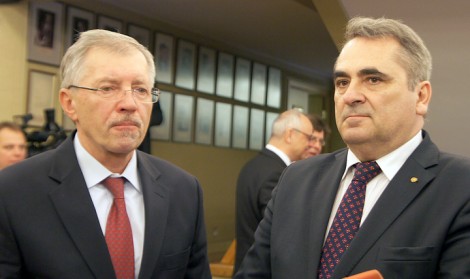- September 10, 2014
- 343
Spelling of Polish names is (not) an important issue

“Problems concerning original spelling of names and surnames or bilingual street plates should be solved, but currently we have more important issues in bilateral relations to discuss” – said the vice chairman of the Seimas from the Social Democratic Party Gediminas Kirkilas. In interview with “Kurier Wileński” he denied he said that.
“The problem concerning original spelling of names or bilingual street plates should be solved, because it is important, but the security issues are no less important for Poland and the Baltic countries” – said Kirkilas in interview with “Kurier Wileński”. As he said, the problem concerning spelling of Polish names in Lithuania was one of the most sensitive topics in Polish-Lithuanian relations. Because of the unsolved problems the relations between these two countries are so tense.
The Polish-Lithuanian Treat from 1994 provides that Polish names and surnames should be written in original form in Lithuania. If a national minority is not allowed by law to use original spelling, it means that Lithuania does not obey the provisions of the Treaty” – said the vice chairman of the Seimas. Last week the State Commission of the Lithuanian Language presented a motion on the spelling of names. It did not allow Poles to write their names in original form in official documents. According to the Commission non-Lithuanian names and surnames could be written in original form in passport only when a foreigner is a spouse of a Lithuanian citizen or when a foreigner acquired Lithuanian citizenship.
“I do not agree with this decision. I will submit another motion to the State Commission of the Lithuanian Language, because maybe in the last one the request to use original spelling of names and surnames of people belonging to a national minority was not expressed clearly enough” – said Kirkilas.
The Head of the Electoral Action of Poles in Lithuania in the Seimas Rita Tamašunienė believes that the issue of original spelling of names and surnames and the bilingual street plates is important to Gediminas Kirkilas as the Co-President of the Polish-Lithuanian Parliamentary Assembly. However, if that is not the case, it should be considered as another attempt to postpone the problem of national minorities.
“It is difficult to say, where Gediminas Kirkilas expressed his opinion and how honest he was. It is true that some important problems to be solved continuously arise and the spelling issue is postponed. I do not want to say that the security issues are not important, conversely, I believe they are of great significance, but it should be discussed in other meetings” – said Rita Tamašunienė in the interview with “Kurier Wileński”.
As she emphasised, the security of the country was not a topic to be discussed by the Polish-Lithuanian Parliamentary Assembly. The problem of original spelling and bilingual street plates should be brought up at the sitting of the Assembly. The Deputy Marshal of the Polish Parliament Eugeniusz Grzeszczak (The Polish People’s Party) met with the vice chairman of the Seimas Gediminas Kirkilas on 8th June. They have talked about current Polish-Lithuanian relations, the perspectives on cooperation between the two countries in the parliamentary dimension and the current international politics. The meeting was also a possibility to discuss the current situation of the Polish national minority in Lithuania.
The Polish-Lithuanian Parliamentary Assembly will resume its work after a break of more than five years. According to Kirkilas the next sitting of the Assembly will take place in October in Warsaw, The last sitting was held in 2009. Next meeting have not taken place because of the lack of progress in solving problems brought up over recent years by Poles living in Lithuania, for example, spelling of names and surnames in Lithuania. There are still no positive decision from the Lithuanian authorities.
Translated by Maciej Jóźwiak within the framework of a traineeship programme of the European Foundation of Human Rights, www.efhr.eu.

